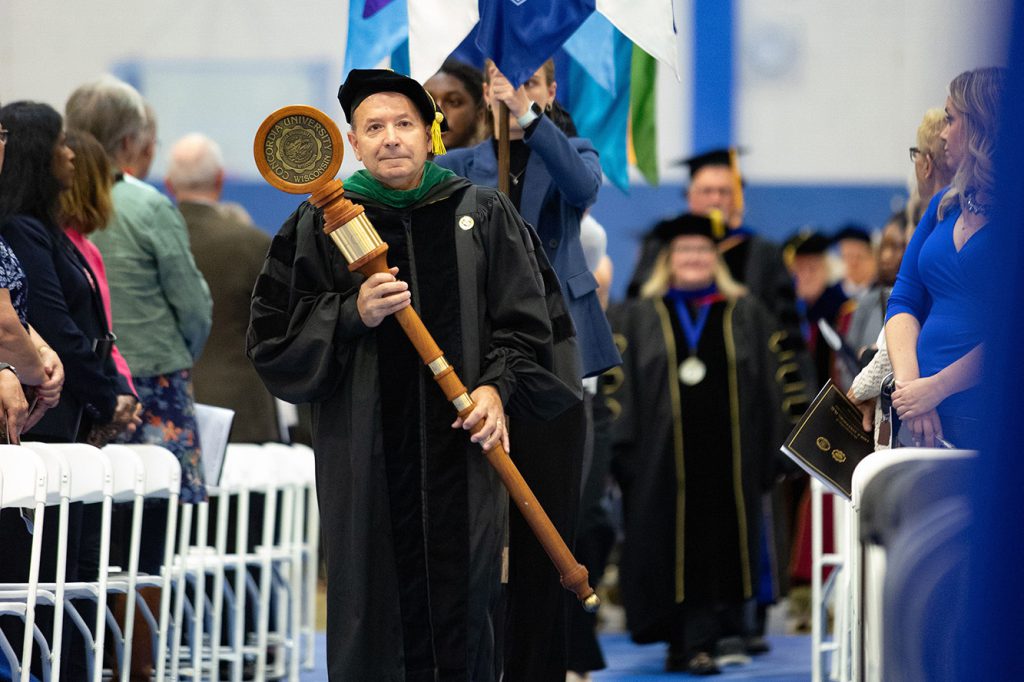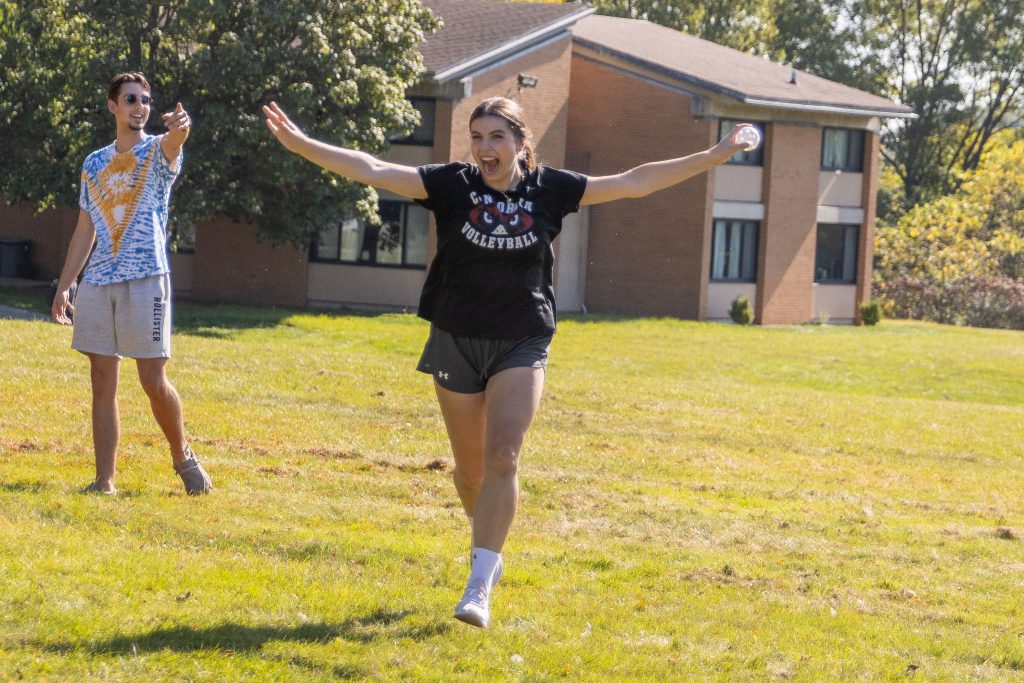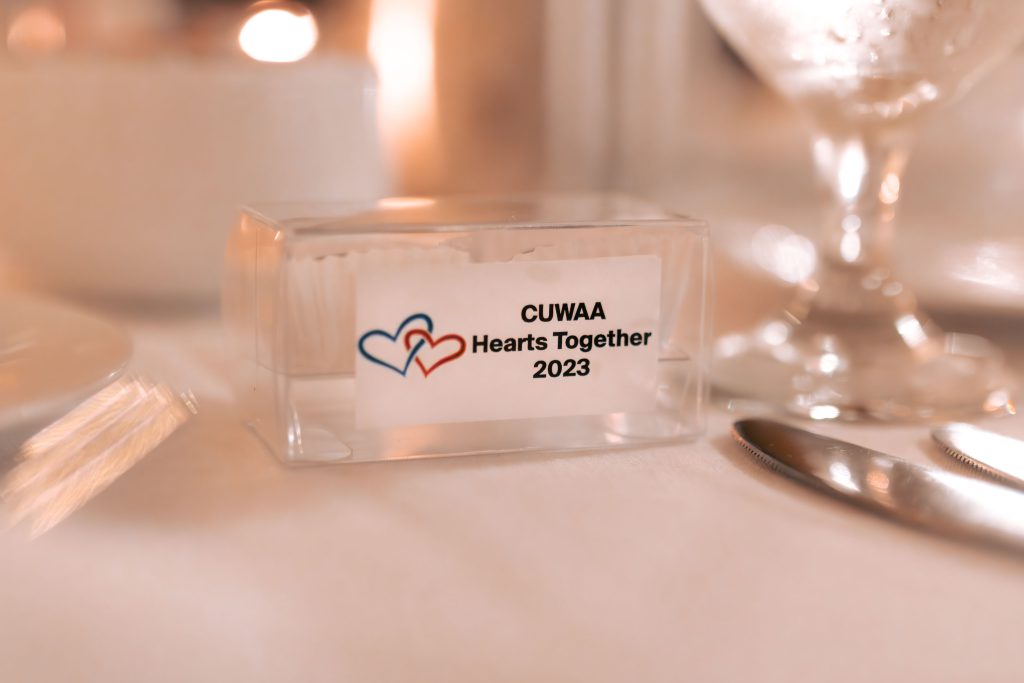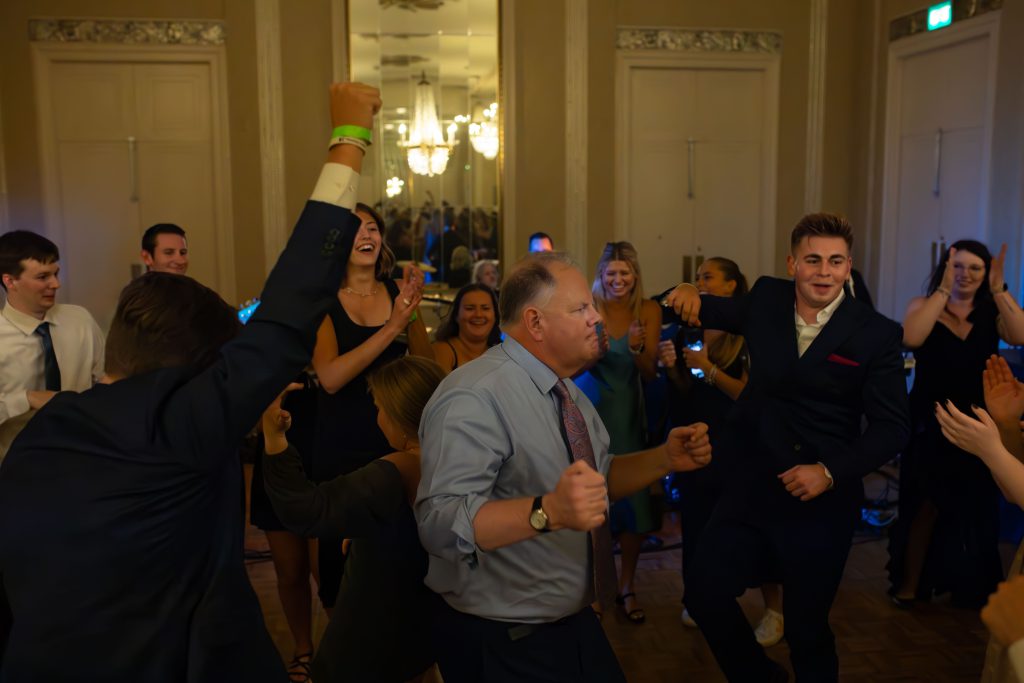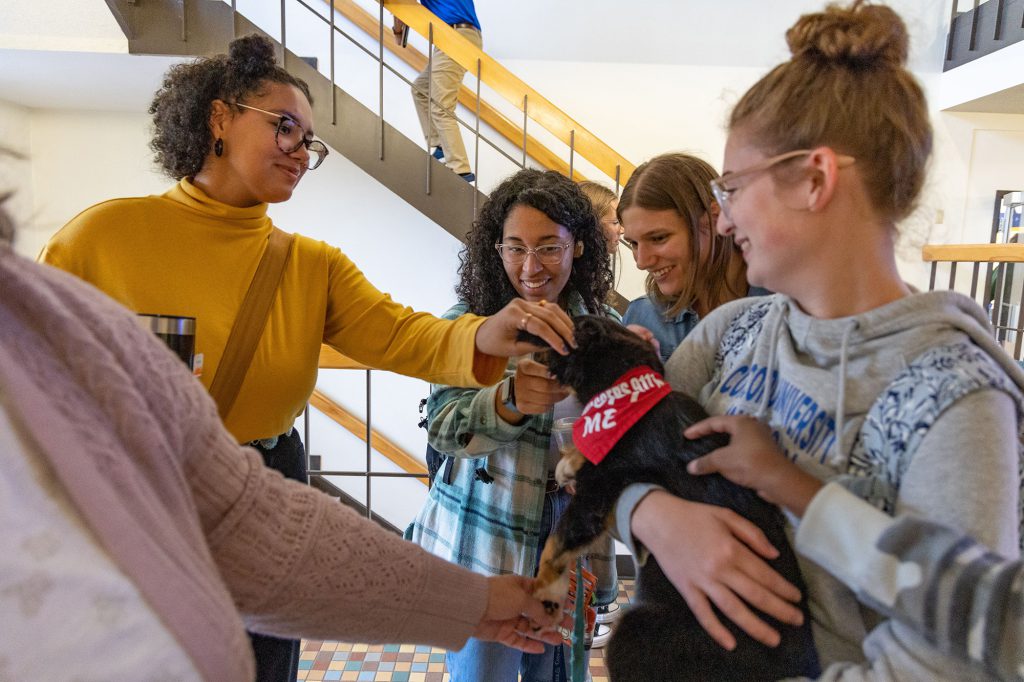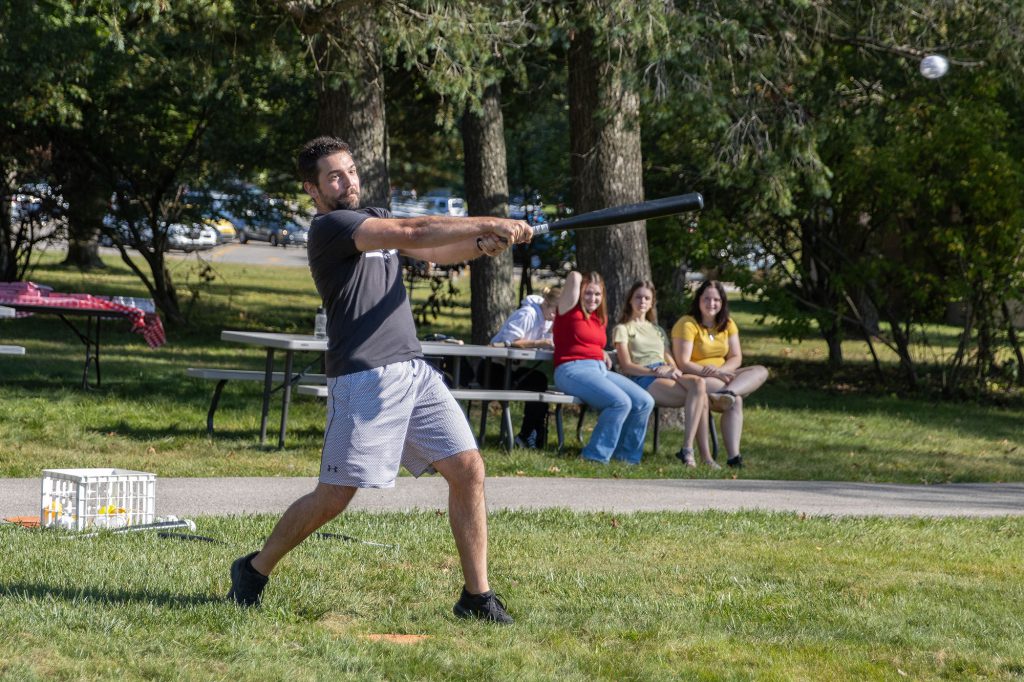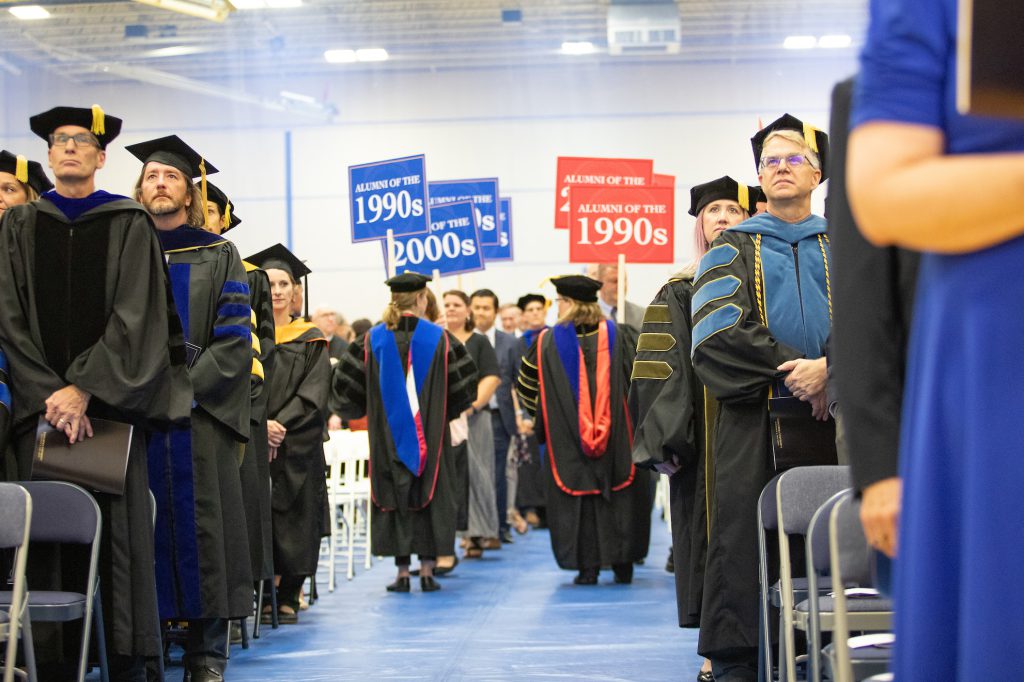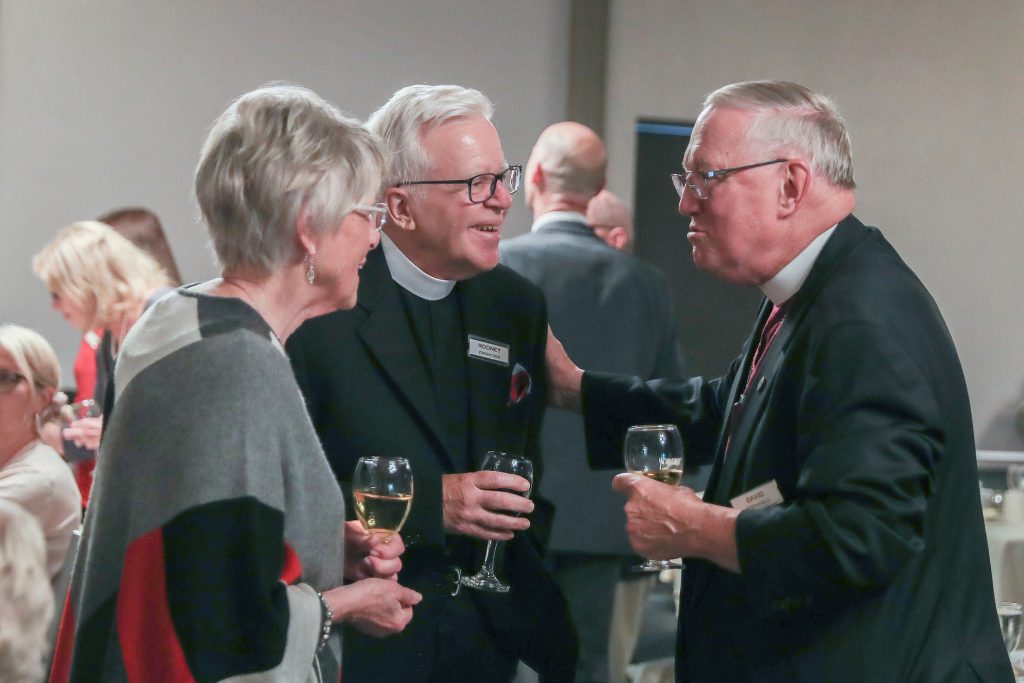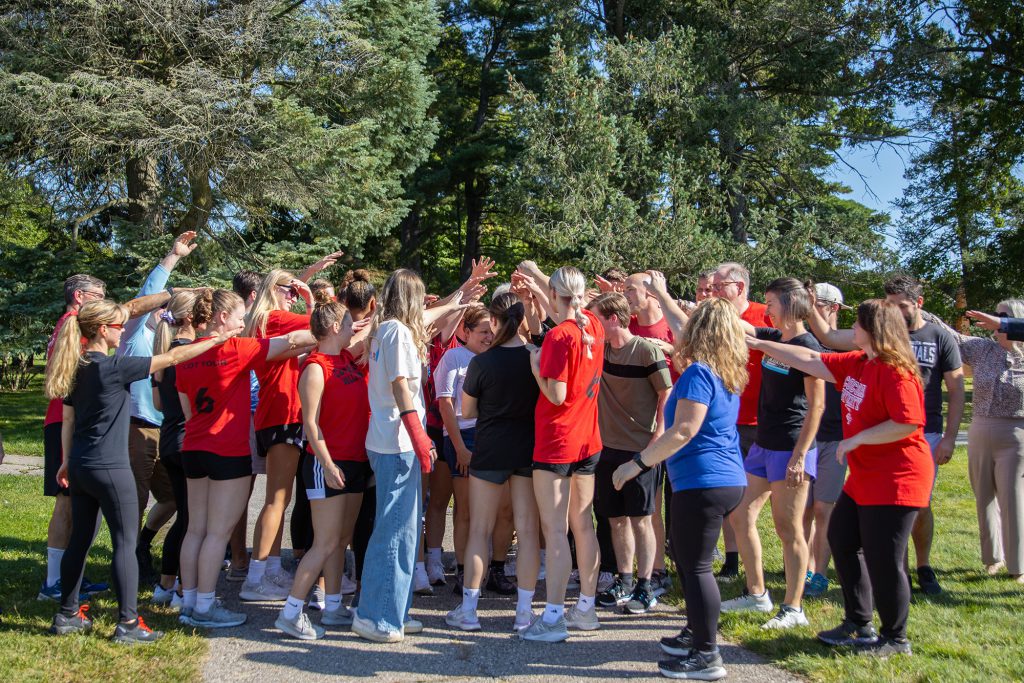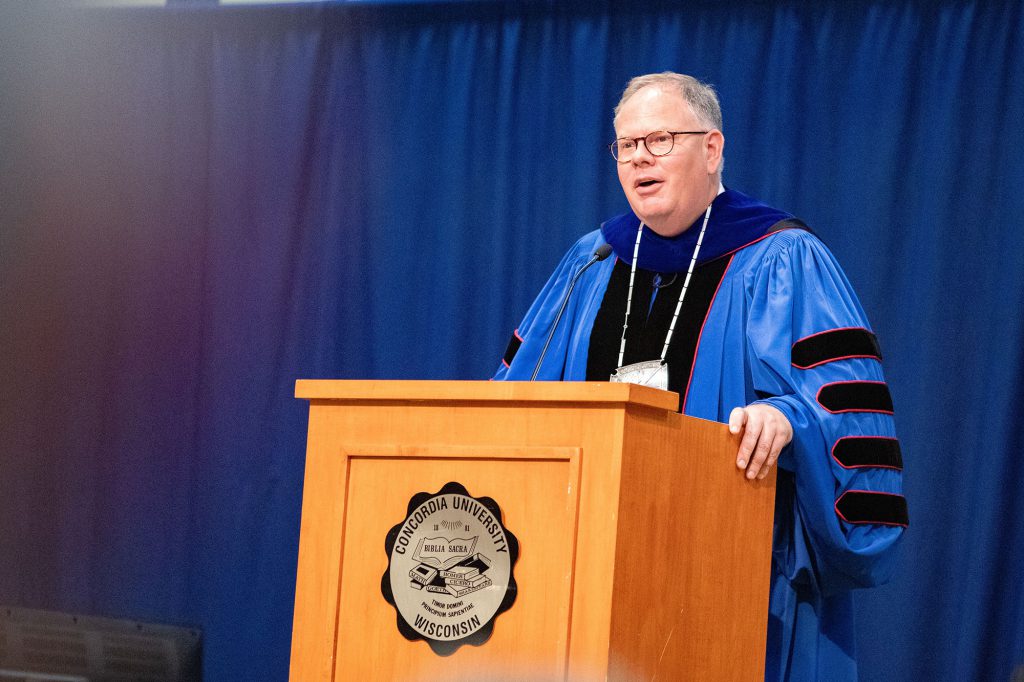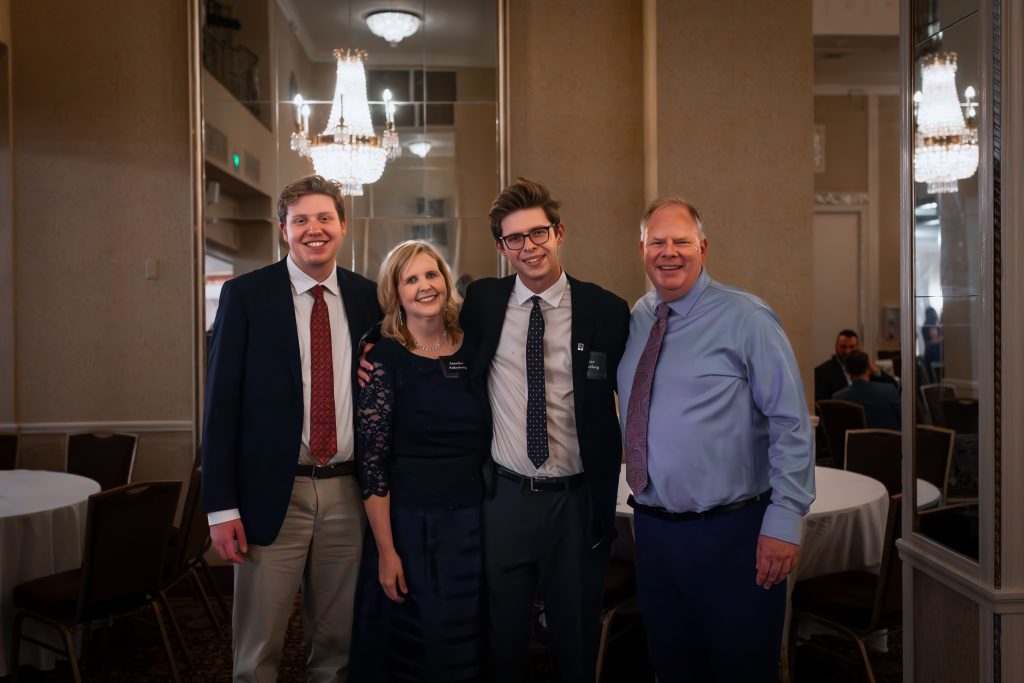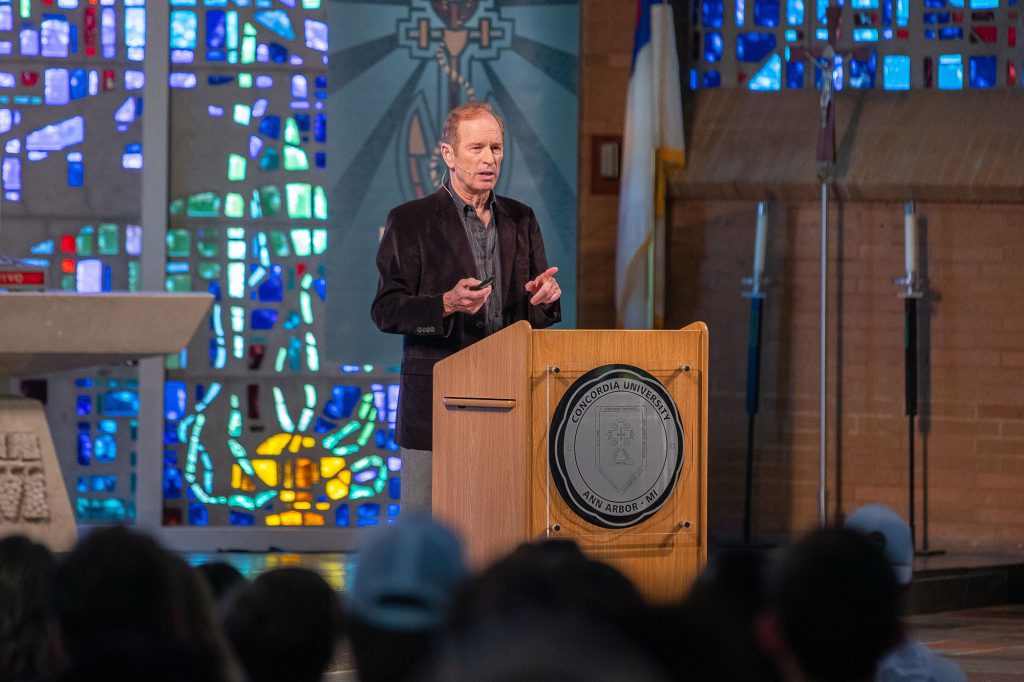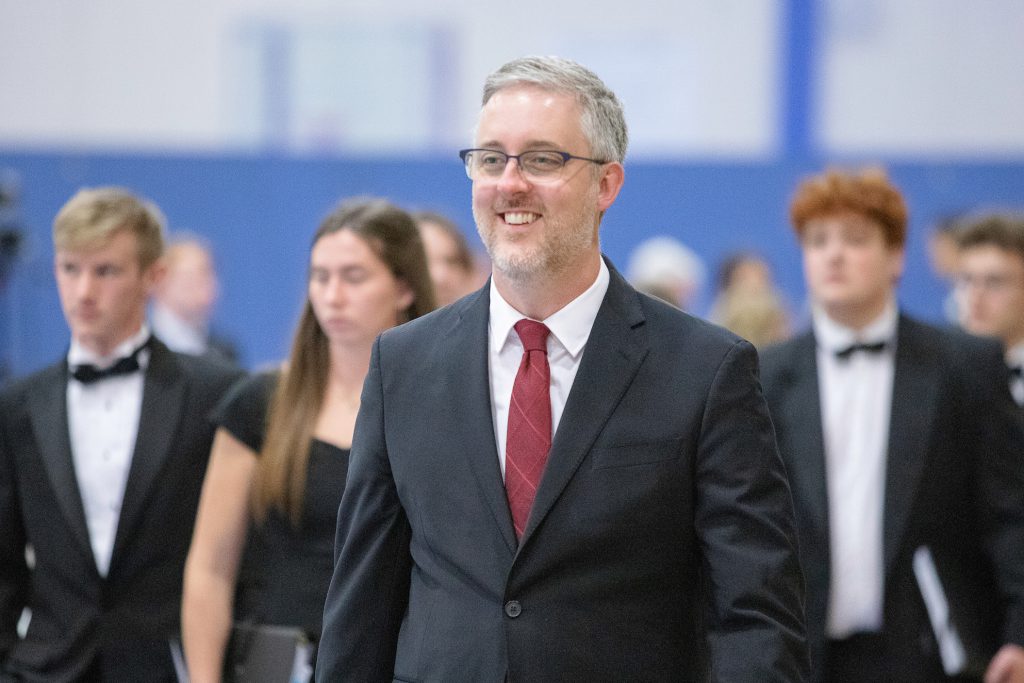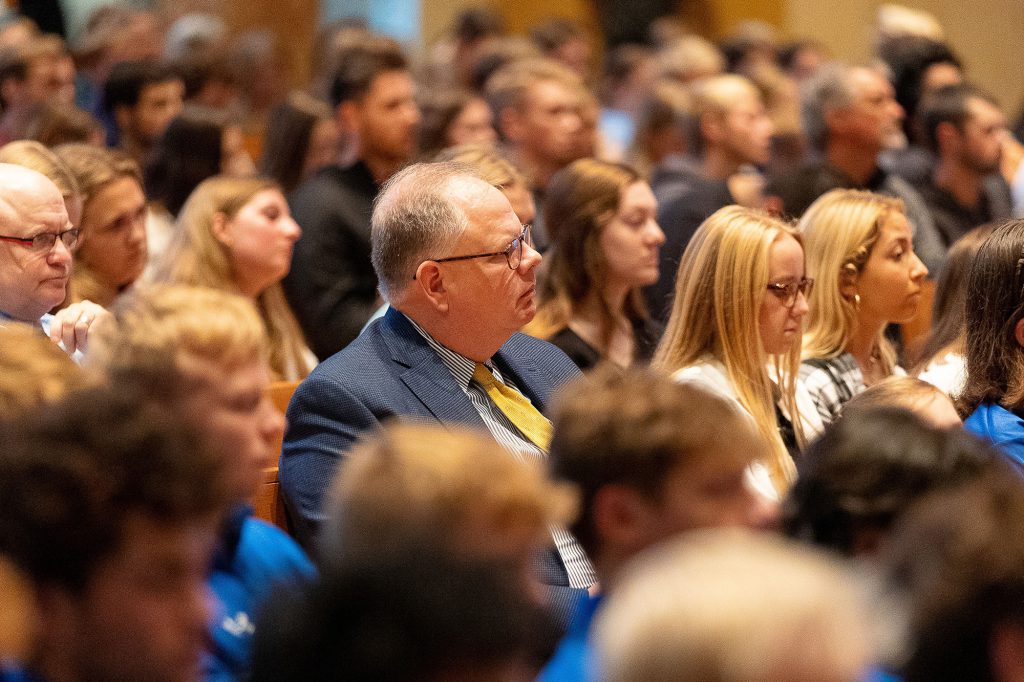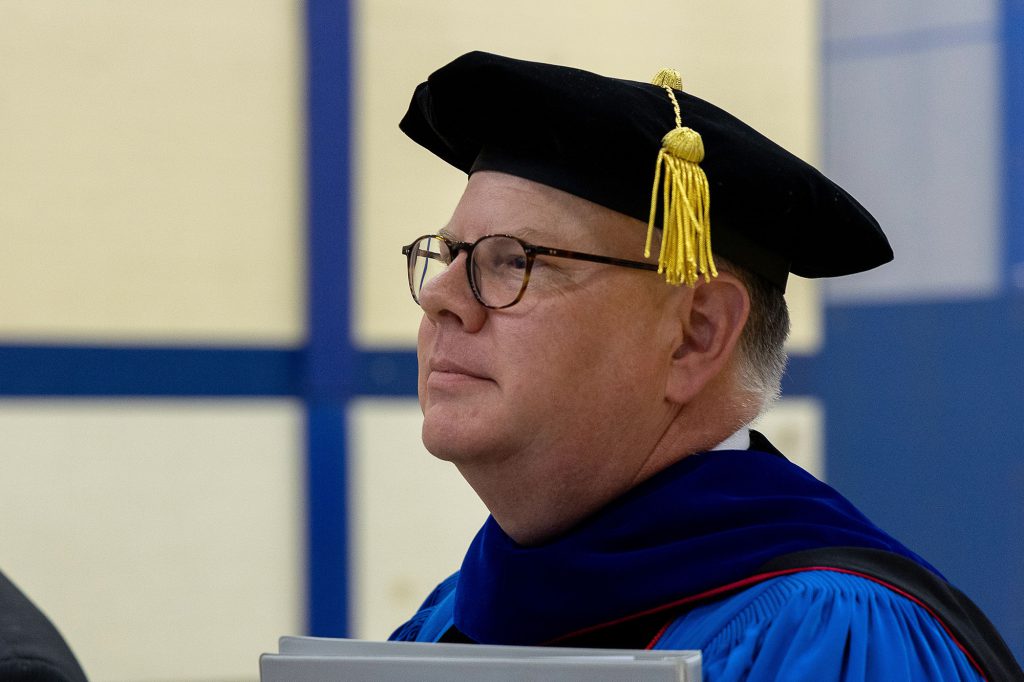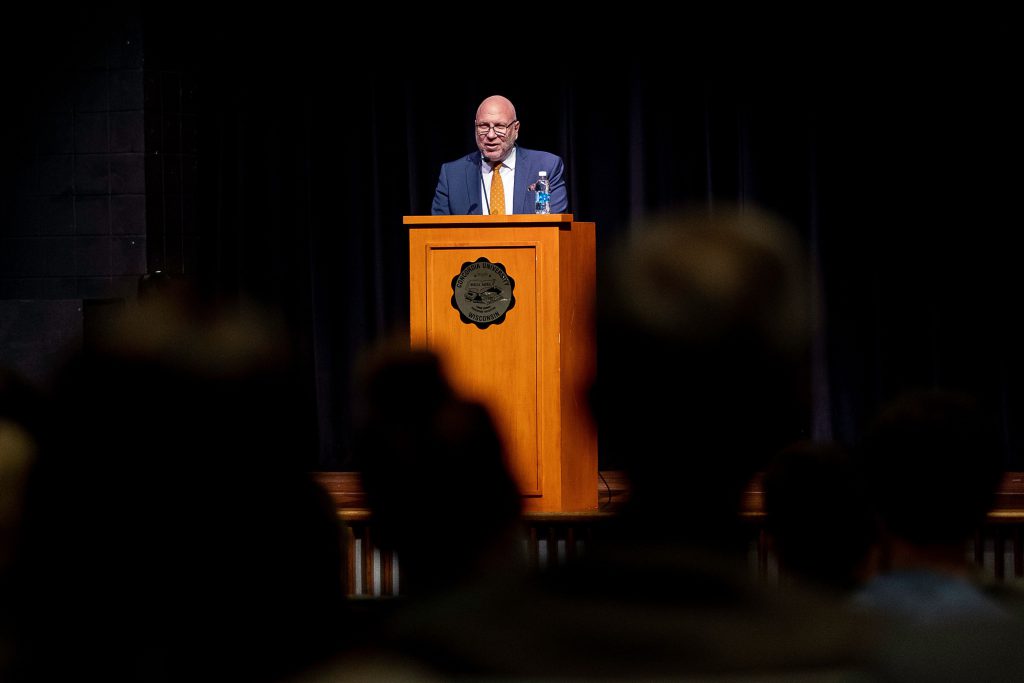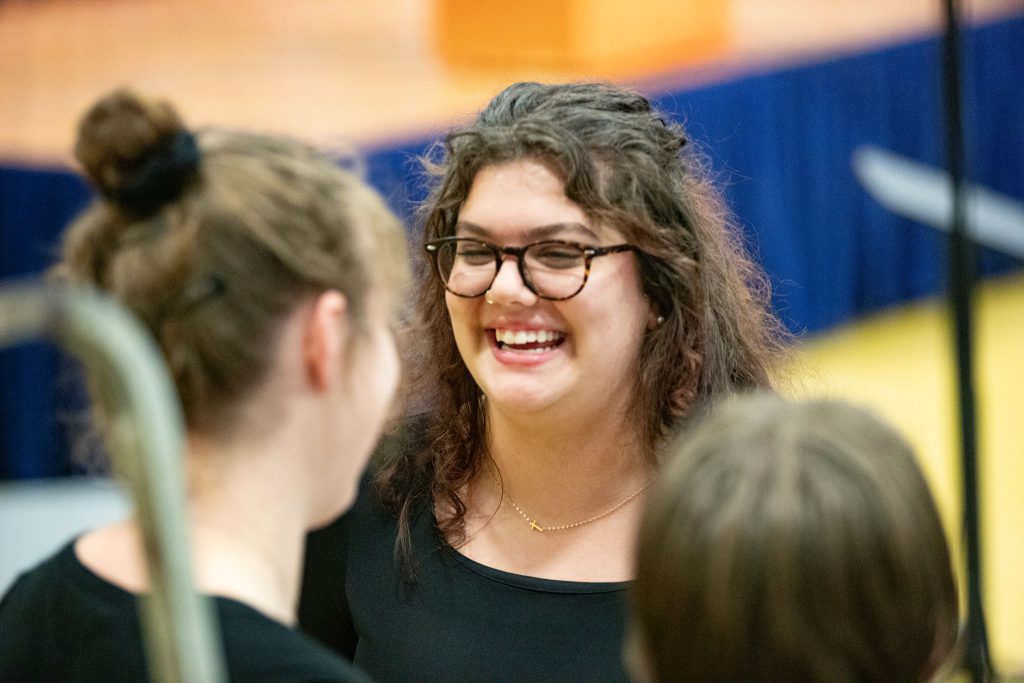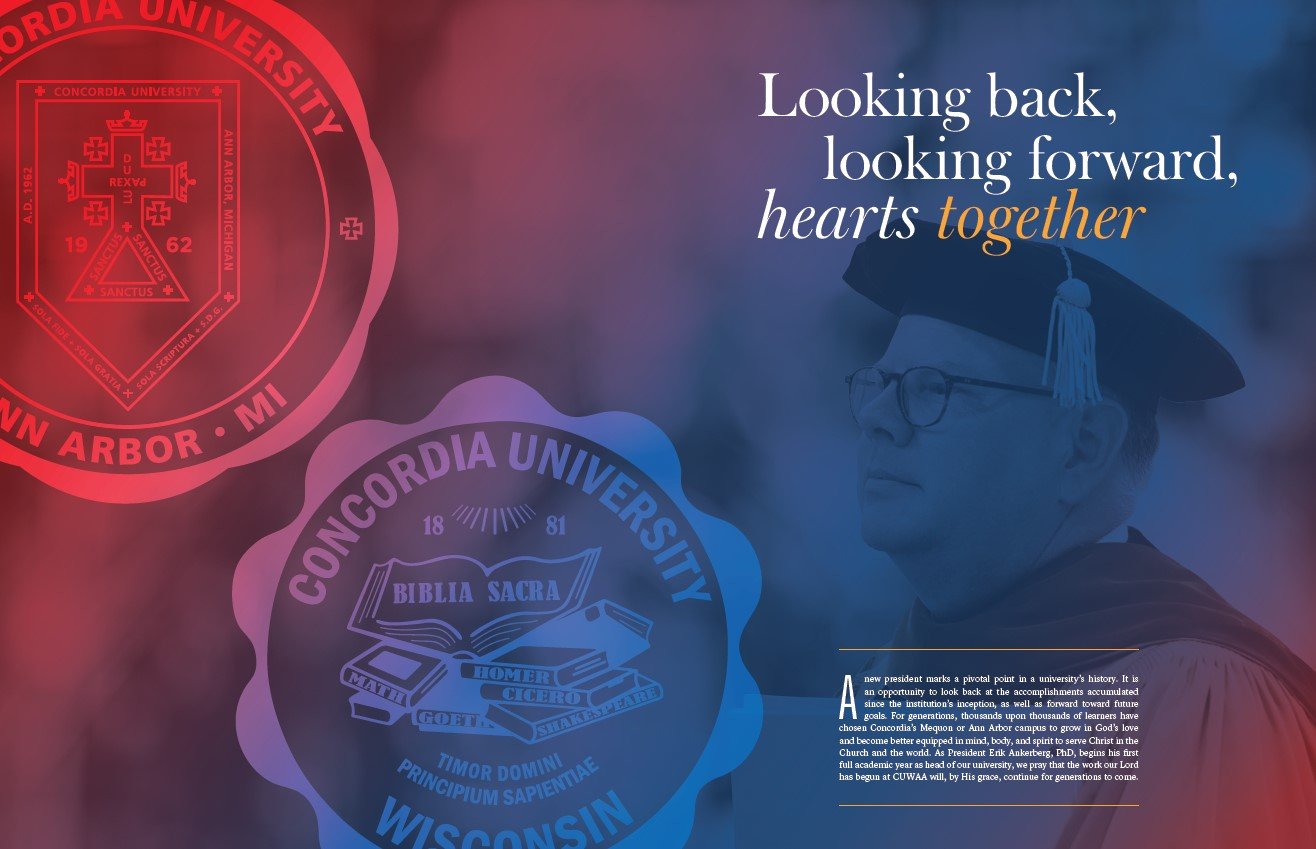
President Ankerberg addressed an audience of Concordia supporters during his inauguration ceremony on Friday, Sept. 29, and shared his vision for the future of the university.
Editor’s note: A version of this letter first appeared in the fall 2023 edition of Hearts Together. The official magazine of Concordia University Wisconsin and Ann Arbor publishes biannually.
At the end of September, Concordia University and its community of supporters marked the inauguration of Erik P. Ankerberg, PhD, with eight days of celebrations on the Mequon and Ann Arbor campuses. Students, employees, alumni, donors, and friends ushered in their new president with a speaker series, special guest preachers, a student poetry contest, a gala, and lots of light hearted fun and games. For his inauguration ceremony on Friday, Sept. 29, Ankerberg addressed the audience and shared his vision for the future of the university. Here is his address.
By Erik P. Ankerberg, PhD, University President
“I wasted time, and now doth time waste me.”
This is the lament of William Shakespeare’s King Richard II, as the failed leader reflects on losing his crown and his kingdom. For me, as a recovering English professor, this confession is one of the saddest moments in Shakespeare’s plays. How does a leader come to the end of his play, and his life, and make peace with his own shortcomings—not to mention the prospect that others will remember him as an
abject failure?
On a day when we are celebrating our university and our work together, I believe it is healthy and honest to face facts. We know we live in a world in which higher education is a challenged enterprise, and many are ambivalent about our efforts. When we consider the factors that impact our commitment to mission, our enrollment, our financial position, and the public perception of our work, we would do well to consider the ways we can ensure, as a university community, that we are not, in Richard’s words,
wasting time.
Today I would gently suggest we can understand our work in relation to three pillars that demonstrate that we, as a university community, are making the most of the time we have:
1) Authentically living out our university values;
2) Pursuing the status of rising regional university;
3) And making our students—and the world—whole.
University values
First, we should remember that our university’s values, in a tangible way, provide the framework of our life together in this community. That is precisely why we are focusing on them so intently this week, and I am so grateful for the thoughtful presentations that we are enjoying throughout this Inauguration Week. When we consider the benefits of being a university that is Christ-centered, a place focused on truth and integrity, excellence, and service, we begin to understand the gravity of the promises we are making to one another. I just want to take a moment and provide a brief summary of my initial understanding of each value:
Christ-centered
Because we are Christ-centered, the person, death, and resurrection of Jesus Christ intersects with every aspect of our work as a university. From that perspective, everything revolves around Him. As a result, we continually look to strengthen our ability to love and care for each other because each person is precious—each one made in the image of God. Consequently, we welcome all to our university community and surround them with the love, joy, mercy, and peace that our Savior brings to us.
Truth and integrity
Likewise, we pursue truth and integrity because when we pursue and encounter truth we discover He is a person—Jesus Christ. From that perspective, we realize that He is our terminus. He provides the integrity—the bond—that holds creation and all of our relationships together; consequently, we care about each individual as a complete human person. In that context, we learn from Him to listen to others, to care about their hurts, and care for their needs. He nurtures empathy within us; He encourages us to be concerned about justice and dignity; and He does this because He gives us hope as He reminds us that He makes all things new.
Excellence
We promote excellence because we want each member of our university community to grow—not just in knowledge and skill—but virtue, as well. We privilege the liberal arts—the studies that free us from the control of others, and simultaneously we invest intentionally in those disciplines that lead more directly to professional careers. We believe that excellence is distinct from elitism, and we prepare our students well to lead lives that are extraordinary—not because of wealth or social status or achievement—but because of faithfulness that manifests itself in an authentic concern for others.
Service
We prioritize service because we want our students to live out an understanding of vocation that transcends the whims or limits of mere careerism and explores widely their roles in families and the church and the state. We strive to orient everyone in this community to turn outward, to look beyond the horizon of their aspirations, and to seek the flourishing of all they meet in their daily lives.
A rising university
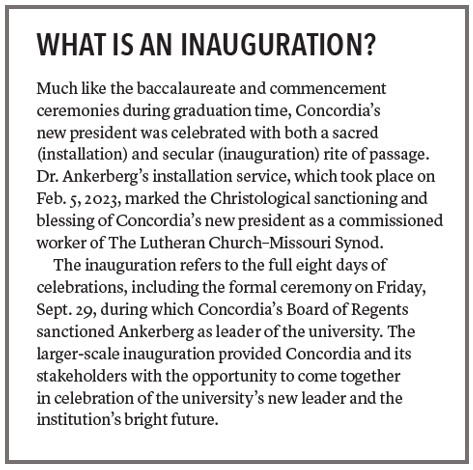
The second pillar that allows us to make the most of our time is aligning ourselves with traditional university success markers. In a highly competitive world—with wavering public confidence in higher education—we recognize the value of using data to demonstrate our university’s contributions to the region. We certainly hope those in our communities will recognize Concordia as a rising regional university—one with a reputation for curating a portfolio of academically rigorous programs and delivering outcomes that prove our commitment to student success.
Likewise, we, like every university, want to thrive: We seek to grow enrollments and our endowment; we should aspire to serve an equal number of traditional undergraduate and post-traditional students; we must pursue a better sense of fiscal discipline and become financially self-sustaining at each campus. We want our retention and graduation rates to demonstrate our influential status as a higher-education institution of choice across the states we serve.
That is why we are in the middle of doing what most universities do today: We are developing a university strategic plan, master plans for both of our campuses, and both strategic budget and enrollment plans. We are also in the process of initiating a comprehensive campaign. These are the necessary steps that denote our health and point us toward an encouraging future. At the same time, while pursuing these positive metrics we must be wise and self-aware enough to acknowledge that a thriving university is feckless and poverty-stricken if it is not faithfully living out its missional commitments.
Making individuals whole
The third pillar involves two interrelated steps: making students— and the world—whole. The first step is making our students whole by encouraging them to gather all that the world has to offer. The cantankerous 20th-century Welsh poet priest R. S. Thomas’ poem “Threshold” gives us a sense of the choices we face as we educate students today:
I emerge from the mind’s
cave into the worse darkness
outside, where things pass and
the Lord is in none of them.
I have heard the still, small voice
and it was that of the bacteria
demolishing my cosmos. I
have lingered too long on
this threshold, but where can I go?
To look back is to lose the soul
I was leading upwards towards
the light. To look forward? Ah,
what balance is needed at
the edges of such an abyss.
I am alone on the surface
of a turning planet. What
to do but, like Michelangelo’s
Adam, put my hand
out into unknown space,
hoping for the reciprocating touch?
Thomas’ poem reminds us that our education allows us to access the widest and deepest forms of knowledge. We can expose students to the most magnificent aspects of the physical world—from the microscopic influence of bacteria to the macrophysical movement of planets—but we come to recognize the limitation of that kind of education: It is incomplete. Thomas’ speaker would have us reach toward the transcendent with wonder, grace, imagination (and we might even say faith). From Thomas’ perspective, then, education makes a person whole when she comes to terms with all that the material world offers, but is only complete when she realizes she is a creature in a world much larger than she realizes and then turns to engage—seriously and intentionally—that which is beyond her temporal experiences with the gift of hope.
The second step is to encourage our students to pour out themselves and all they have gained in an effort to make the world whole. The 17th-century British poet George Herbert explores this possibility in his dramatic sonnet “The Holdfast,” where his speaker and the speaker’s interlocutor wrestle with essential questions about the nature and purpose of life:
I threaten’d to observe the strict decree
Of my dear God with all my power and might;
But I was told by one it could not be;
Yet I might trust in God to be my light.
“Then will I trust,” said I, “in Him alone.”
“Nay, e’en to trust in Him was also His:
We must confess that nothing is our own.”
“Then I confess that He my succour is.”
“But to have nought is ours, not to confess
That we have nought.” I stood amaz’d at this,
Much troubled, till I heard a friend express
That all things were more ours by being His;
What Adam had, and forfeited for all,
Christ keepeth now, who cannot fail or fall.
Herbert’s speaker—like most of us in the contemporary world—wants to advocate for a quality of life that is determined by our own efforts and knowledge and skill—our own “power and might.” The interlocutor frustrates the speaker by continually unraveling his assumption that the “good” things he has accumulated constitute a “good” life. Herbert proposes a provocative understanding of life: We are better off when we acknowledge that we have nothing, and—ironically—we actually possess “all things” only when we first admit that we do not own or control the world around us. From this perspective, we might gain the “world” of knowledge and skills and achievements, but we can only avoid “losing our souls” when we confess that those things were never truly our possessions in the first place. Their true value and purpose only become apparent when we willingly learn how to lose things we have gained—by pouring out ourselves and all that we have into the gaping holes of our neighbors’ lives.
Shakespeare’s Richard does indeed find a form of redemption for his wasting the time in his life—the self-awareness he gains allows him to rise to defend himself, even as he comes to his tragic end. He thinks, and he acts nobly—not a bad model for us as a university community today. When we intentionally remember our university values and live them out in our life together as a university community; when we seriously and consistently hold ourselves accountable to the markers that we believe define the meaningful work of a rising regional university; when we make students whole by helping them gain all of the knowledge and skills available to us, and at the same time encourage them to give up those things to make others whole—only then do we see the true opportunities that lie before us. As we pursue these three pillars, we will come to remember that, through the blessed work of the Holy Trinity, we have in the past carried out—and we must continue in the future to carry out—the extraordinary work of providing our students with a transformative and uncommon education that develops students in mind, body, and spirit for service to Christ in the Church and the world. If we bring ardor and faithfulness to that work, we will come to see that we are not wasting time; we are not serving time; we are redeeming time.
Support Concordia’s commitment to whole-student development
We invite you to honor President Ankerberg’s start at Concordia by supporting our students through scholarship aid or the university’s greatest need, the Concordia Fund. Gifts of any size are appreciated and do make a difference. Visit cuw.edu/give or cuaa.edu/give.
The fall 2023 Hearts Together magazine hit mailboxes in November. View a PDF version of the magazine here. If you are not on our mailing list, but are interested in receiving a free copy, email Jennifer.Hackmann@cuaa.edu.

